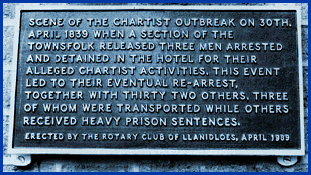
Llanidloes
The Chartist Outbreak, 1839
Perhaps the most widely known period in the long history of Llanidloes was centred on the events of just five days in 1839 involving the local Chartists.
Chartism was a national workers movement born out of the destitution and harsh working conditions of the times, and mass discontent had been increasing dramatically during the 1830's, encouraged by the economic depression of 1837/8.
In the Llanidloes district the situation was made worse by a growing crisis in the flannel industry with competition from the northern mill-towns and threats to the prospects of handloom weavers due to the introduction of water-powered looms.
plaque on the
wall of the
Trewythen Arms
Hotel, Llanidloes

The hated Poor Law Act of
1834, which replaced poor relief from the parish with grim
institutional workhouses, was another significant cause of mass
resentment, as were the Corn Laws which kept grain prices artificially
high.
The movement took its name from the 'People's Charter' of 1838,
which demanded votes for all men and other changes to a political
system which denied democratic rights to all but the priveliged
gentry of the day. In Llanidloes only 86 men, just over 2% of
the constituents, were allowed to vote.
In England the main centres of militancy linked to the movement were the Midlands and the industrial north, whilst in Wales there was disruption in Newport in the south, Newtown and Llanidloes.
There are 5 pages on the Chartists. Use the box links below to view the other pages.